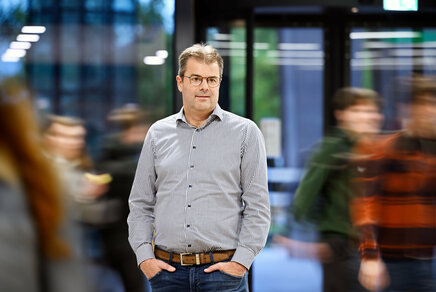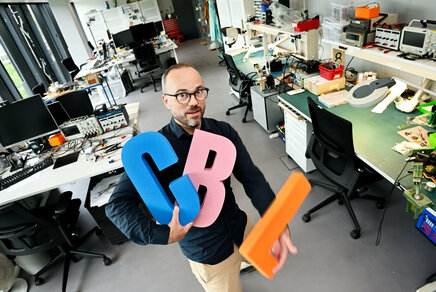Collaboration and excellence at the heart of new Executive Board
The Executive Board does not foresee any major strategic changes to the Institutional Plan, only other emphases.
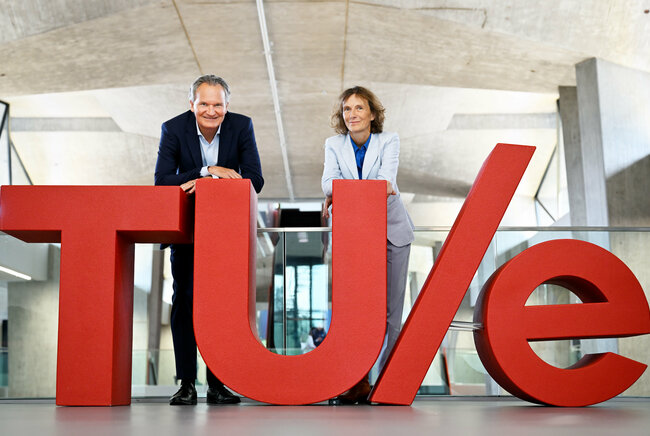
The Executive Board is not quite complete yet, but President Robert-Jan Smits and new Rector Silvia Lenaerts are eager to move forward. While waiting for a new vice-president to arrive, they share what they consider important for the future of TU/e: a greater focus on excellence, academic values, governance and reducing bureaucracy.
“In front of you is a new board, but not yet complete,” says Executive Board President Robert-Jan Smits, seated at the table in his room in Atlas with new Rector Silvia Lenaerts next to him. This week, they opened the new academic year together before a packed Blauwe Zaal and Senaatszaal. “It was fantastic to see so many people come along to our beautiful program,” Smits proudly states.
The board of our university has been subject to quite a few changes this year: as President Robert-Jan Smits began his second term, Rector Frank Baaijens made way to Silvia Lenaerts after eight years. After 11 years at TU/e, Vice-President Nicole Ummelen became the new president of the Open University. The procedure for her succession is in full swing. And in June, University Secretary Susanne van Weelden was succeeded by Patrick Groothuis, previously the director of Education and Student Affairs (ESA).
100 days
At the time of the interview, Lenaerts has already completed her first one hundred days and then some. “TU/e is a really nice club,” she says with a big smile. “There is an atmosphere here of ‘we are young and want to make something beautiful together’. I have already met so many fine people with an enormous passion for the university. The fact that people regard TU/e as their campus and community and want to help build it further – in connection with the city and the Brainport region - gives me a great feeling.”
Academic values
She would like to see a greater focus on academic values and human contact within ‘that nice club’. “I’m not saying that this isn’t there now, but I want to bring academic values more to the fore. Autonomy and freedom are important, of course. Collegial cooperation, looking out for one another, listening to each other and dealing with one another with respect and integrity – regardless of background or vision – are at least as important.”
Personally, she is of the direct approach. “Be honest and direct and talk to each other,” she suggests. “Say what you are doing and do what you say. This often avoids things escalating.”
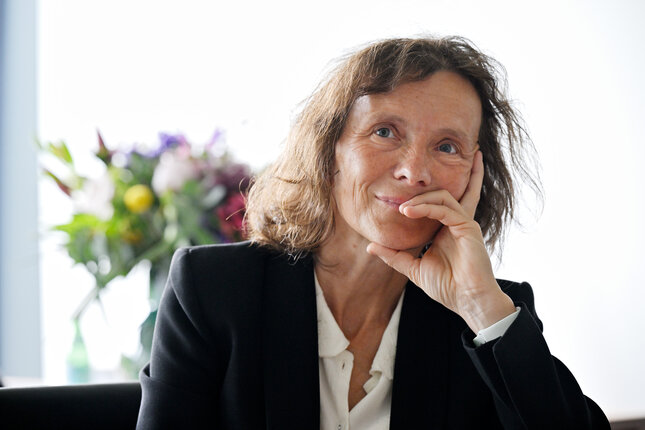
Be honest and direct and talk to each other.
Rector Silvia Lenaerts
To emphasize the importance of academic values and integrity, former Dean of Industrial Engineering & Innovation Sciences Ingrid Heynderickx will soon be appointed as Integrity Ambassador.
Trust
Every board change is accompanied by necessary dynamics. Getting to know one another and one another’s style of leadership and collaboration is taken seriously with mutual commitment. Lenaerts: “We really want to know each other very well so that we can trust one another completely. We strive for everybody to be able to use their individuality to take up the things that are close to their heart – and to be able to include the others in that.”
“Silvia is right,” Smits confirms. “We want to invest a lot in each other. We had a team day; we talk often and share a lot with each other. We want the new board, including the secretary, to be a super-tight team. We want to be able to discuss difficult cases together and draw one common thread through them.”
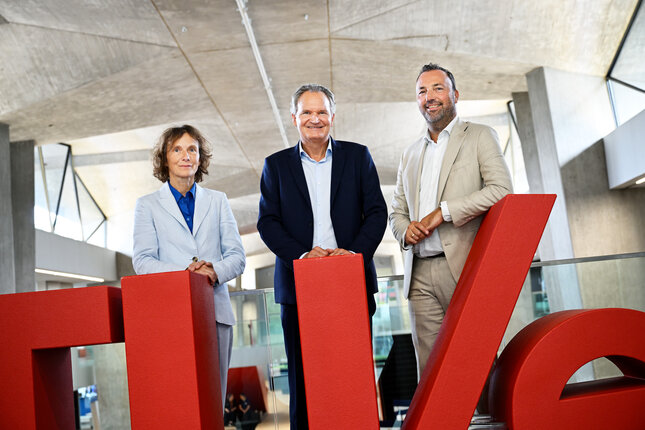
Secretary
“With Patrick Groothuis, we have brought in a ‘heavy’ secretary who picks up big cases and wants to move forward, just like us,” Smits says. He concludes, with satisfaction, that they are already getting to know each other quite well. “I’m sometimes amazed at how we think exactly the same about many things. Silvia has enormous energy and commitment. She likes speed, wants to get on with things.” “We have that result orientation in common,” says Lenaerts.
Many applicants
The application process for the new vice-president is now underway. “The final selection round is at the end of October, then we will know who will replace Nicole Ummelen.” It will be early 2024 by the time the new vice-president gets to work, expects Smits.
The Executive Board is proud that there is so much interest in the position. “We’ve had responses from 50 to 60 candidates, even from abroad,” says Smits. “So, our reputation and renown are in good shape,” they are satisfied to conclude.
Redistribution
Until the board is complete again, the portfolios with strategic subjects have been divided between the two board members and the university secretary. Smits: “I’ve taken up campus development and knowledge security; Silvia is doing personnel management.” Lenaerts: “I want to be fully committed to people, connections and collaboration.”
“And because Silvia has an enormous passion for valorization, she has taken that over from me,” Smits continues. “We will also later discuss this with the third board member, of course. We want to involve each other in everything.”
Bureaucracy
When she started at TU/e, Lenaerts noticed that the university has a lot of procedures. “I like a direct approach, but a more ‘judicial’ approach via long mails is more often chosen.” Smits came to the same conclusion when he came to TU/e from Brussels four years ago. “I find the bureaucratic hassle much greater here than at the European Commission. In addition, I have more meetings here than in Brussels, which people can hardly believe,” he says.
“The university is much more complex, which is partly down to us but also due to all of the regulations imposed on us by the government. We have to account for knowledge safety, student wellbeing, finances, et cetera. We need to look at where we can scale back so that our people have more time to do their real work,” Smits says.
Simplification
There is also work to be done internally, say Lenaerts and Smits. “I see a lot of collaboration between departments and researchers, but I also see compartmentalization between departments and services,” Lenaerts notes. “Different people do more or less the same work but from different compartments. This could be more efficient.”
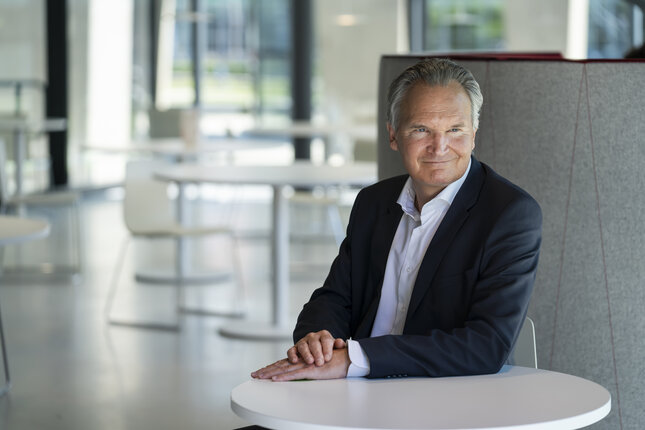
It cannot be that a PI at another department has different rights.
Executive Board President Robert-Jan Smits
“We need to review our internal procedures and working methods,” Smits believes. “There are unwanted differences between departments when it comes to, for example, appointment advisory committees or the PI (principal investigator, ed.) model. We need to make it more straightforward and standardize it. It cannot be that a PI at another department has different rights.”
“We need to standardize as well as simplify,” Lenaerts adds. “The question of why we do something a certain way is no longer being asked. An extra step of complexity is simply added instead of looking at why we do something the way we do it or at how something could perhaps be done away with.”
Governance
Simplification and more efficient work are also wishes of the Executive Board when it comes to the governance of our university, the way in which TU/e is managed. “We have many forums in which we have meetings on the same subjects,” Smits gives as an example. “We talk with the deans, with the directors, with the institutes. We often talk about the same subjects but never with everyone together. This could be more efficient.”
We often talk about the same subjects but never with everyone together. This could be more efficient.
Executive Board President Robert-Jan Smits
This conclusion was endorsed by the deans at the dean’s dinner before the summer vacation. Smits: “We were pleased that there was a lot of recognition among the deans. We have to build the university together. It’s not services versus departments - we need to do it collectively.” A working group led by Dean Edwin van den Heuvel is going to look at how the governance set-up can be improved.
Engagement with new strategy
The board believes that it is important to engage the community in forming a new vision for the future. The current Institutional Plan will run through to 2025. Last year, this plan was scrutinized together with the community during the midterm review. As a result, there will be a greater focus on excellence, sustainability and wellbeing.
“We see no reason to make radical changes to the current Institutional Plan,” Smits says. “Fortunately, the deans are of the same opinion. Excellence will remain the focus and we will look at how to better attract and retain talent, including by modernizing our research infrastructure.”
It is not only science for science but also science for society.
Rector Silvia Lenaerts
From outside to inside
The nine departments are currently in the process of writing their scientific strategies. “This is the moment to make sure that those strategies are more aligned,” says Smits.
Another key point here is that departments are thinking more than ever about their contribution to society. “How are they going to help shape the transitions? There needs to be more thinking in terms of outside to inside,” Smits says. “It is not only science for science but also science for society,” concludes Lenaerts.
More on our strategy

